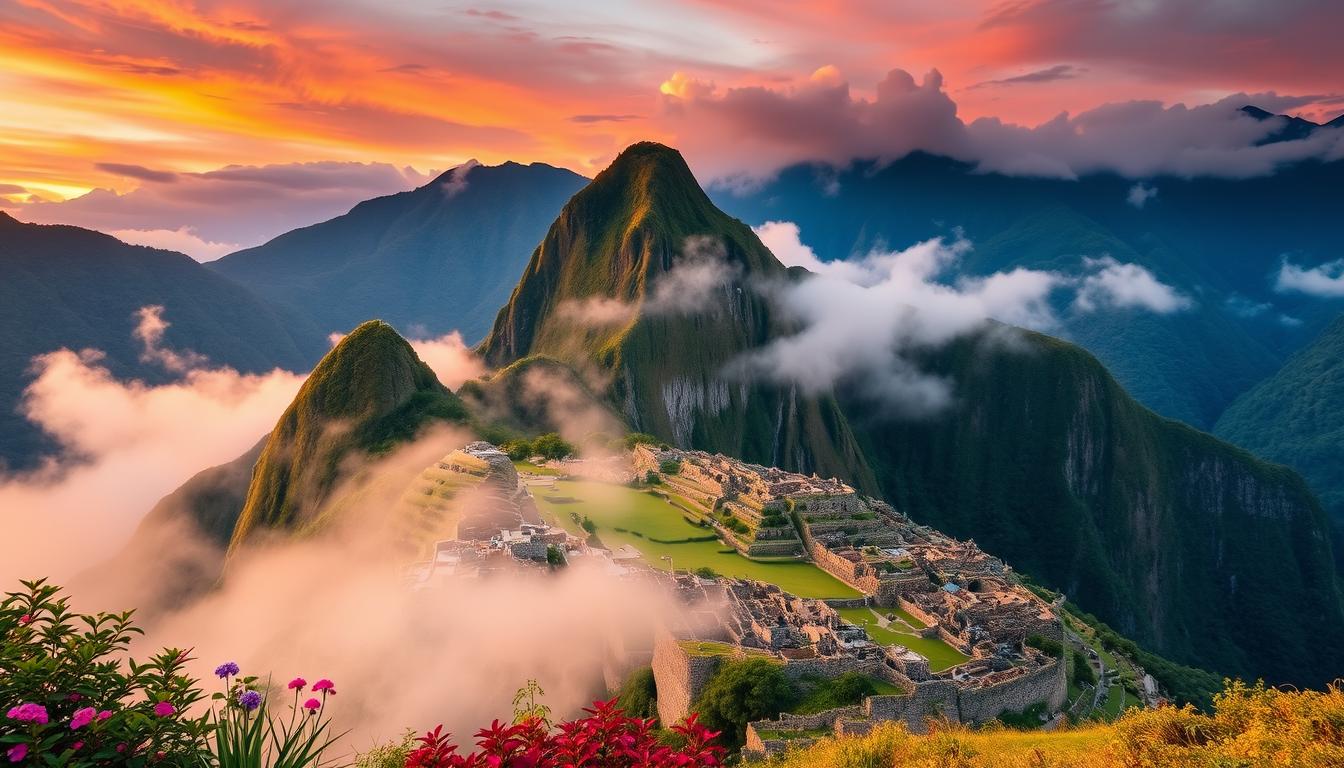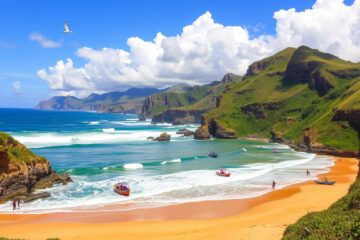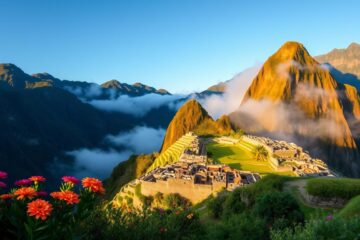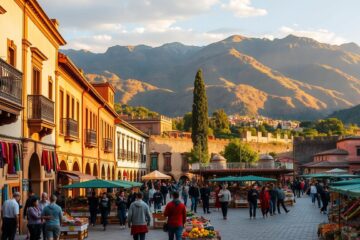Arequipa, Peru’s second-largest city, is a treasure trove of attractions. It’s called the “White City” because of its beautiful sillar architecture. The city has a UNESCO World Heritage Historic Center, stunning volcanoes, and the breathtaking Colca Canyon nearby.
The weather in Arequipa is pleasant all year round. Its colonial-era buildings, photogenic plazas, and delicious local food make it a perfect spot for travelers. It’s a mix of history, culture, and natural beauty in Peru.
Key Takeaways
- Arequipa is known for its stunning colonial architecture and historic landmarks.
- The city offers a diverse range of cultural experiences, from visiting the Santa Catalina Monastery to exploring local markets.
- Outdoor enthusiasts can enjoy trekking in the Colca Canyon and admiring the majestic Misti volcano.
- Arequipa’s vibrant food scene features traditional Peruvian dishes and a thriving craft beer culture.
- The city’s museums provide insights into the region’s rich Inca heritage, including the well-preserved mummy of Juanita.
Explore the Historic Center of Arequipa
Discover the wonders of Arequipa’s historic center, a UNESCO World Heritage site. It’s famous for its stunning white sillar stone buildings. At the heart of the city lies the captivating
Plaza de Armas
, a lively square. It’s surrounded by impressive structures like the Basilica Cathedral and colonial-era arcades. Palm trees add to the serene ambiance.
The
Cathedral of Arequipa
dominates the northeast corner of the plaza. It has nearly 500 years of history, blending Renaissance and Baroque styles. Admire its intricate façade and explore the interior to learn about the city’s religious past.
One of the most captivating is the
Santa Catalina Monastery
. Founded in 1579, it offers a glimpse into Arequipa’s past. Its vibrant blue and ochre-colored buildings, winding alleys, and tranquil plazas are unique.
“The Historic Center of Arequipa is a true gem. It showcases the city’s rich through its well-preserved colonial architecture and religious sites. Exploring these landmarks is a must-do for any visitor to Arequipa.”
Discover the Colca Canyon
The Colca Canyon is a gem in the Andes, perfect for Arequipa Adventure Travel and Arequipa Outdoor Adventures. It’s the second-deepest canyon globally, offering a stunning view of Peru’s rugged landscape.
Trekking Opportunities
The Colca Canyon is a dream for hikers, with trails for all levels. You can take day trips or longer treks to see villages, viewpoints, and cultural sites. A highlight is the Mirador Cruz del Condor, great for spotting Andean Condors, the world’s largest flying bird.
Wildlife Watching
Birdwatchers will love the Colca Canyon, home to many species. You can see Andean Condors, Geese, Hawks, and Hummingbirds. The canyon also shelters Vicuñas and Vizcachas, making it a wildlife paradise.
Scenic Views
The Colca Canyon is a sensory delight, with breathtaking views. You’ll see cliffs, rivers, and hot springs like La Calera. It’s a perfect place to relax after exploring.
The Colca Canyon is ideal for those seeking Arequipa Adventure Travel or Arequipa Outdoor Adventures. It offers great trekking, wildlife, and scenery.
Visit the Museo Santuarios Andinos
In the heart of Arequipa, the Museo Santuarios Andinos (MUSA) showcases the Inca civilization’s rich culture. Opened in 1997, it’s in the historic Casa del Fundador. This 18th-century colonial building offers a unique cultural experience.
Learn About Mummy Juanita
The museum’s highlight is the “Mummy Juanita,” or “Ice Maiden.” Found in 1995 on Ampato volcano, over 6,000 meters high, Juanita’s remains are a window into Inca rituals. She was a 13-year-old Inca girl, sacrificed over 500 years ago to the gods.
Inca Heritage Display
The museum also displays artifacts from Inca sacrificial ceremonies across Peru’s mountains and volcanoes. Visitors can see the remains of five mummies from Misti volcano in 1998. This gives a full view of the Inca’s respect for nature and their complex religious practices.
The Museo Santuarios Andinos offers a deep dive into Arequipa’s Arequipa Cultural Experiences and the Inca legacy. It’s perfect for history buffs or anyone wanting to dive into the region’s heritage. This museum is a key stop in Arequipa.
Experience Arequipeña Cuisine
Arequipa, known as the “White City” of Peru, is famous for its amazing food traditions. It sits under three big volcanoes. This city is a food lover’s dream, offering a taste of Arequipa Local Cuisine.
Must-Try Dishes
Visiting Arequipa means trying its famous dishes. You must try rocoto relleno, a spicy stuffed pepper. Another favorite is chupe de camarones, a shrimp chowder. For the bold, cuy chactado, or fried guinea pig, is a unique taste of Andean traditions.
Popular Restaurants
The heart of Arequipa’s food scene is the picanterías, or traditional restaurants. They are found in the San Lázaro district. These places let you dive into the area’s rich food history. For a real taste of Arequipa Food Tours, take a cooking class or visit the San Camilo Market.
“Arequipa’s cuisine is a delightful fusion of Andean and Spanish influences, creating a truly unique and authentic dining experience.”
Arequipa’s food scene is full of spicy dishes, lively picanterías, and bustling markets. It’s a journey into Arequipa Local Cuisine that will stay with you long after you leave.
Take a Tour of the Santa Teresa Church
In the heart of Arequipa, the Santa Teresa Church is a symbol of the city’s deep religious roots. Built in 1710, this stunning Baroque-style church is a key part of Arequipa Religious Sites and Arequipa Architecture Tours.
Baroque Architecture
The Santa Teresa Church is famous for its detailed Baroque architecture. Its ornate façade, with intricate carvings and elegant arches, is a sight to behold. Inside, the grand interior is filled with elaborate altars, sculptures, and paintings, creating a breathtaking atmosphere.
Historical Significance
The Santa Teresa Church is a significant historical site, showcasing Arequipa’s rich cultural heritage. Guided tours offer a deep dive into its history and the treasures it holds. Hearing the nuns sing the Angelus at noon is a unique experience that takes you back in time.
“The Santa Teresa Church is a must-visit attraction for anyone interested in Arequipa’s Arequipa Religious Sites and Arequipa Architecture Tours.”
For history buffs, architecture lovers, or anyone looking to immerse themselves in culture, the Santa Teresa Church in Arequipa is unforgettable.
Stroll Through the Yanahuara District
Just a 30-minute walk from the iconic Plaza de Armas, the Yanahuara district offers a peaceful escape from Arequipa‘s busy center. It’s famous for its Arequipa Viewpoints and well-kept Arequipa Neighborhoods. This area gives a peek into the city’s rich architectural history.
Scenic Views
The Yanahuara district’s main attraction is the Mirador de Yanahuara. This viewpoint, surrounded by elegant stone arches, offers stunning views of Arequipa and El Misti volcano. It’s one of the city’s most iconic natural landmarks.
Traditional Architecture
Walking through Yanahuara’s quaint streets, you’ll see its well-kept colonial-era architecture. The area has several old churches from the early Spanish settlement. They show the mix of European and indigenous styles that make Arequipa unique.
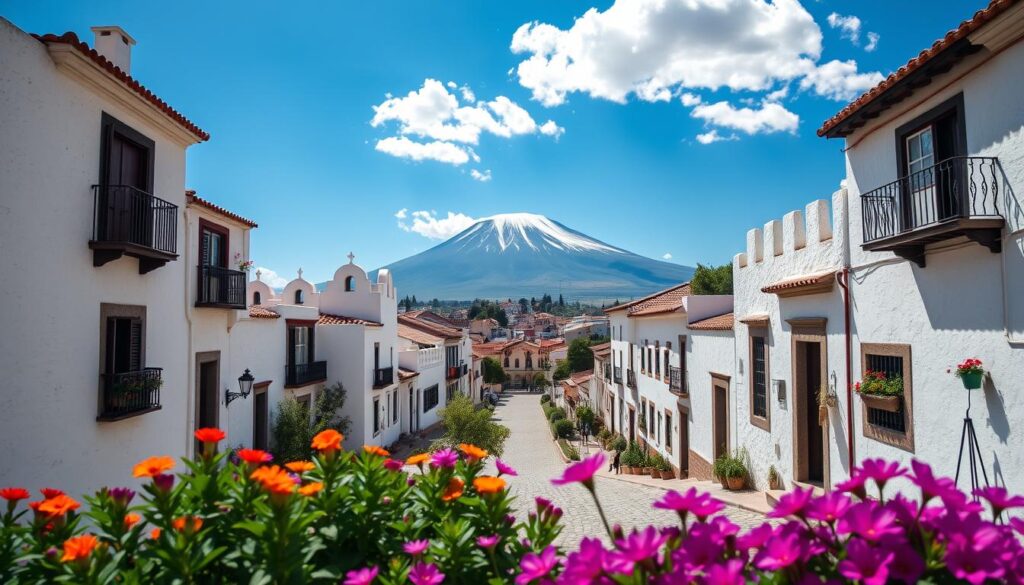
“Exploring the Yanahuara district is a must for any visitor to Arequipa. The stunning views and traditional architecture transport you to a bygone era, offering a peaceful respite from the bustle of the city center.”
Looking for amazing views or wanting to learn more about Arequipa’s culture? A walk through Yanahuara district is a must during your visit to this magical Peruvian city.
Enjoy the Arequipa Village Festival
Arequipa, known as the “White City” of Peru, shines with life during the Fiestas de Arequipa. This major cultural festival happens every August. It celebrates the city’s founding in 1540, offering a chance to dive into the Arequipa cultural experiences.
Cultural Significance
The Fiestas de Arequipa deeply connect with the city’s history and traditions. The festivities include colorful parades, lively music, dance competitions, and food fairs. These Arequipa events draw visitors from all over Peru, letting them see the local culture up close.
Activities During the Festival
- Vibrant parades with elaborate costumes and performances
- Energetic music and dance competitions celebrating Arequipeño traditions
- Bustling food fairs offering an array of local delicacies and dishes
- Lively cultural displays and demonstrations of traditional crafts
- Thought-provoking exhibitions showcasing the city’s rich history and heritage
The Fiestas de Arequipa is a great chance to dive into Arequipeño culture. You can enjoy the vibrant parades, lively music and dance, or try the local food. This annual festival is a celebration of Arequipa’s identity that you won’t forget.
“The Fiestas de Arequipa are a testament to the resilience and pride of the Arequipeño people, showcasing the city’s rich cultural heritage and vibrant traditions.” – Juana Guzman, Cultural Historian
Visit the La Campiña
Just outside Arequipa’s lively city, you’ll find La Campiña. This green paradise shows off the area’s rich farming history and beautiful nature. You can see traditional farms, where locals grow crops and keep old farming ways alive.
Agricultural Life
See rural Arequipa’s life by visiting small farms and family estates in La Campiña. Watch farmers work their fields, growing corn, quinoa, and veggies. Learn about their green farming methods and respect the hard work that brings food to Arequipa’s tables.
Stunning Landscapes
Traveling through La Campiña’s hills and valleys, you’ll see amazing views. Volcanoes like Misti stand tall behind the farms and old buildings. Find old watermills, like Molino de Sabandía, that use rivers and streams, showing the area’s industrial past.
Exploring the Arequipa Countryside and La Campiña is essential for anyone wanting a real Arequipa Day Trips experience. Enjoy the calm of this green place and feel the lasting spirit of Arequipa’s farming traditions.
“The Arequipa countryside is a revelation, a tapestry of vibrant greens, hidden watermills, and the towering presence of the Andes. It’s a place where the past and present coexist, offering a profound connection to the land and its people.” – Jane Doe, Travel Blogger
Explore the Sabandía Mill
The Sabandía Mill is in the Sabandía district of Arequipa. It’s a key part of the Arequipa Historical Sites and Architecture Tours. Built in 1621, it’s a 17th-century marvel that shows the area’s rich history and old water-powered tech.
Historical Importance
The Sabandía Mill is a symbol of Arequipa’s lasting heritage. It could grind up to 800 kilograms of grains in 8 hours. This made it crucial for the area’s farming for centuries. Visitors can see inside and learn about its history through tours, diving into the city’s past.
Guided Tours
Visitors must pay S/5.00 for adults, S/3.00 for school kids, and S/2.00 for little ones to see the mill’s inside. Guided tours offer a deep dive into the mill’s workings and the beautiful gardens around it. The ‘City Tour Campiña’ package, which includes the mill, costs 50 soles per person. It’s a great way to see Arequipa’s cultural highlights.
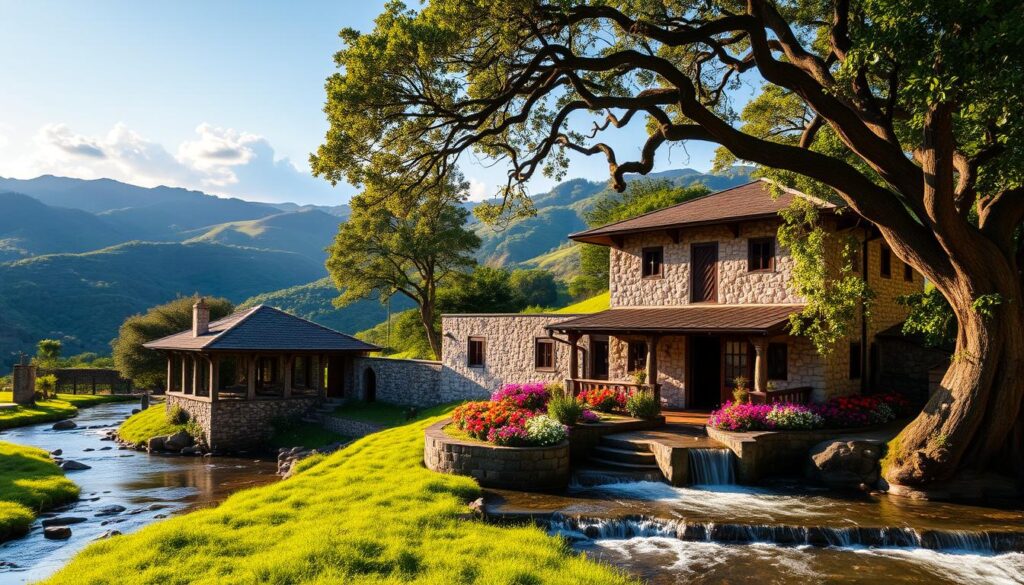
The Sabandía Mill is about 10 kilometers from Arequipa’s Plaza de Armas. A taxi ride from the plaza costs around 15 Peruvian soles (5 US dollars). Or, you can take a bus for 2 Peruvian soles. A visit to the Sabandía Mill is essential for anyone interested in Arequipa’s history.
Relax at the Mantiqueira Farms
The Mantiqueira Farms are in the heart of Arequipa. They offer a chance to dive into the area’s rich farming history and eco-tourism. This place is a hidden gem, showing the best of Arequipa Eco-Tourism and Arequipa Agricultural Tours. It’s a unique spot to learn about organic farming and local produce.
Organic Products
The Mantiqueira Farms grow a variety of organic crops. You can see fresh fruits, veggies, herbs, and spices. Walking through the fields, you’ll learn about how they farm sustainably. The farm’s focus on organic farming means their produce is tasty and good for the planet.
Educational Tours
Visiting the Mantiqueira Farms is special because of the educational tours. Guides share knowledge about the area’s farming traditions. You’ll learn about the history, techniques, and challenges of sustainable farming.
On these tours, you can even help out by planting or harvesting. With a 4.93 out of 5 rating from 142 reviews, the Mantiqueira Farms are unforgettable. They’re perfect for nature lovers, foodies, or anyone wanting to relax and learn about Arequipa’s farming heritage.
Hike in the El Misti Volcano
For the adventurous traveler, hiking up El Misti Volcano is a thrilling outdoor activity in Arequipa. This Peruvian stratovolcano stands at 19,101 feet (5,821 meters). It offers a challenging trek with breathtaking views.
Difficulty Levels
The El Misti hike is not for beginners. It’s a demanding trek that requires two days to reach the summit. The first day’s hike takes about 6 hours, and the second day’s ascent is 13 hours long.
The high altitude and steep terrain make it strenuous. Temperatures range from 75°F at the base to 15°F at the peak.
Preparation Tips
- Proper acclimatization is crucial, as the high altitude can lead to altitude sickness if not properly addressed.
- Adequate physical fitness and endurance are necessary to tackle the challenging terrain, which includes sheer drops, rock faces, and sections of ice and snow.
- Hiring a professional guide is highly recommended, as they can provide necessary equipment, ensure safety, and offer valuable insights into the local culture and history.
The El Misti hike is not for the faint of heart. But the sense of accomplishment and the views from the summit are unforgettable. For those willing to take on the challenge, the trek up this iconic Peruvian volcano promises a transformative and awe-inspiring journey.
| Statistic | Value |
|---|---|
| Peak Altitude | 19,101 ft / 5,821 meters |
| Duration of Climb | 6 hours on Day 1, 13 hours on Day 2 |
| Total Trek Distance | Approximately 16 miles |
| Altitude Temperature Range | 75°F at base to 15°F at high altitude |
| Cost of Climbing | Around $100 USD per person |
| Popularity of Climb | Not common, only 4 other people on the volcano during the trek |
| Difficulty Level | Rated 12/10 due to the challenging nature of the climb |
“The final push to the summit of El Misti Volcano is marked by a metal cross, a testament to the determination and resilience of those who conquer this awe-inspiring challenge.”
Unwind at the Thermal Baths of Yura
The Thermal Baths of Yura are a peaceful escape, just an hour from Arequipa. These natural hot springs are famous for their healing properties. They are rich in minerals like sulfur, calcium, and iron, which are good for your health.
Health Benefits
Visiting the thermal baths can help with many health issues. It can improve blood flow, ease muscle pain, and help your skin. It’s a great way to relax after seeing Arequipa’s sights or hiking in the Colca Canyon.
Accessibility
The Thermal Baths of Yura are easy to get to from the city. They’re just an hour’s drive from Arequipa’s center. It’s a perfect spot for a relaxing day trip or a break during your travels.
